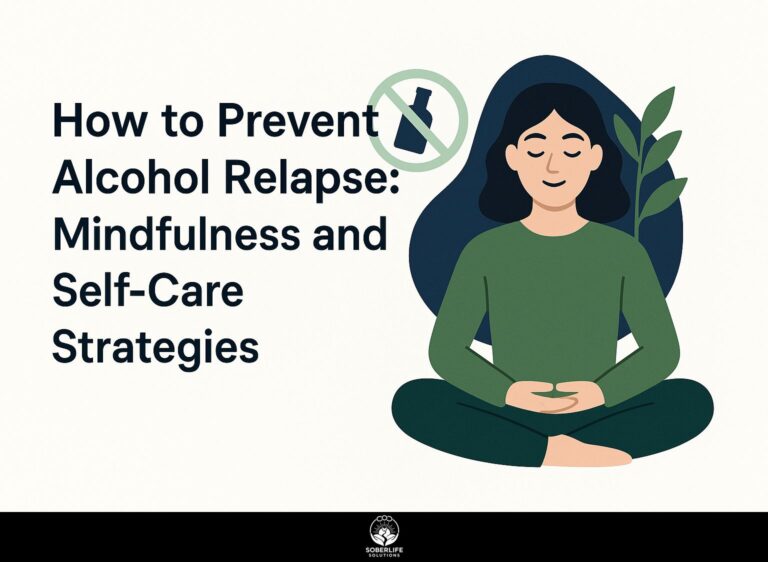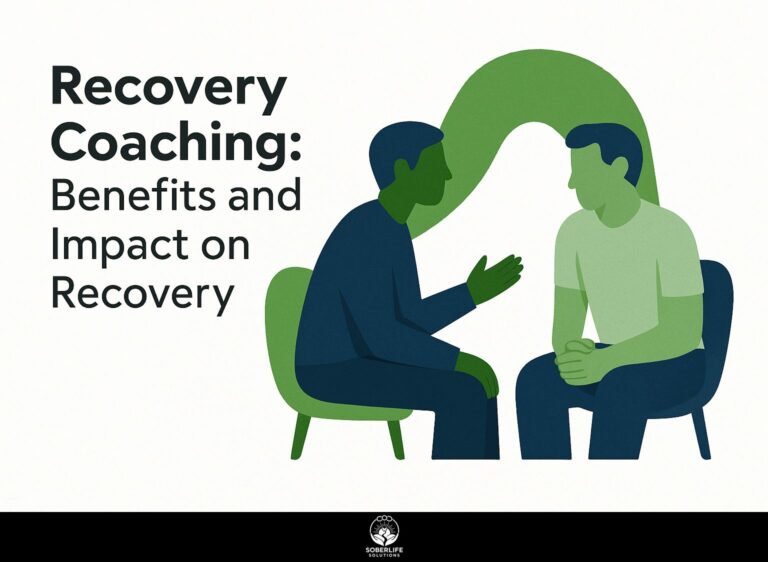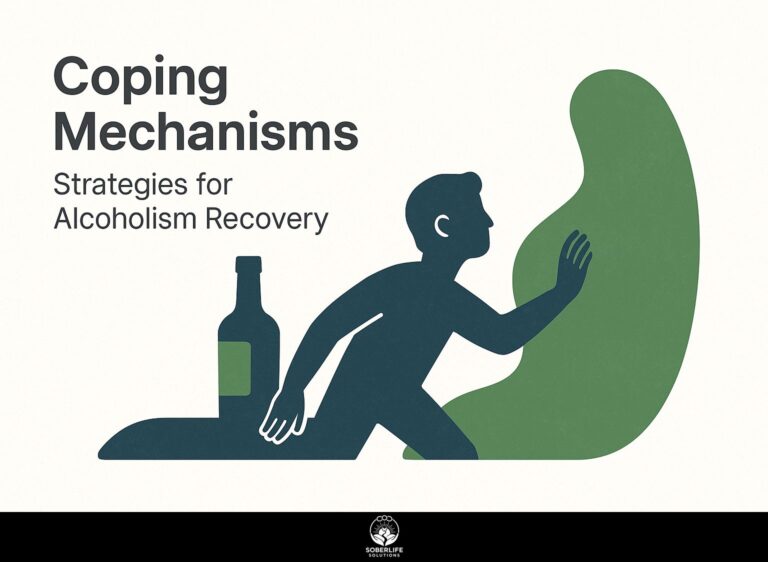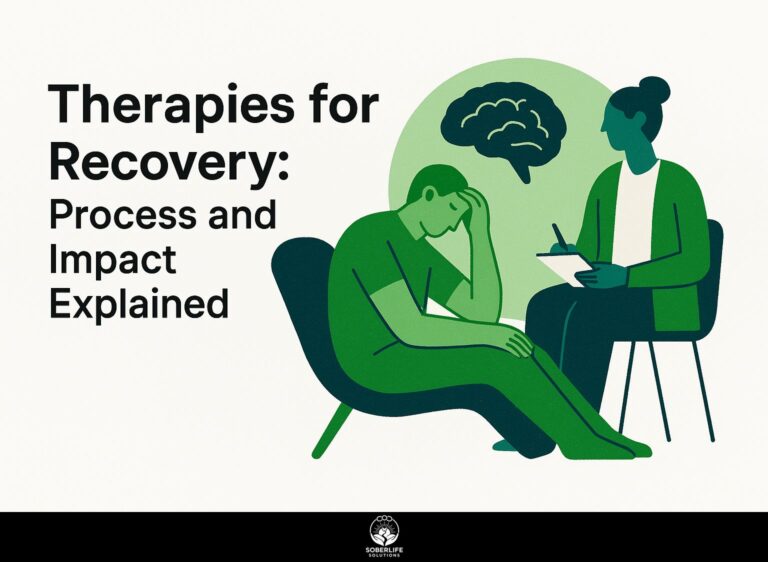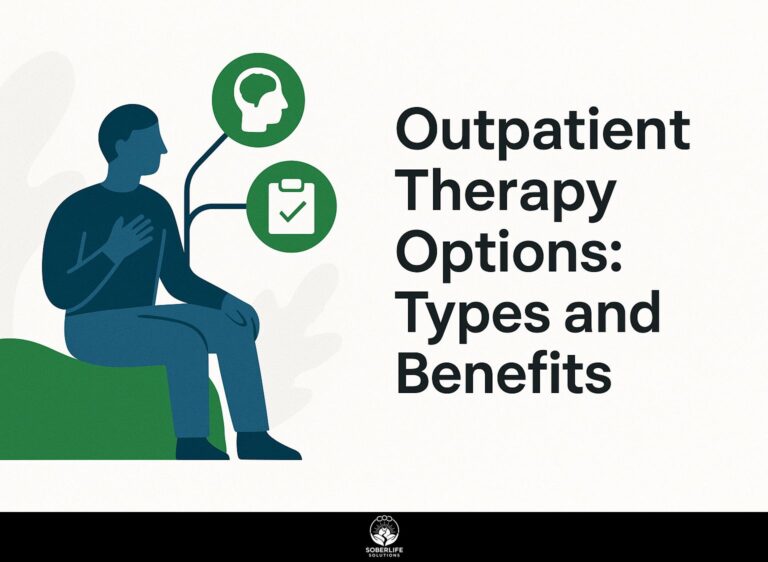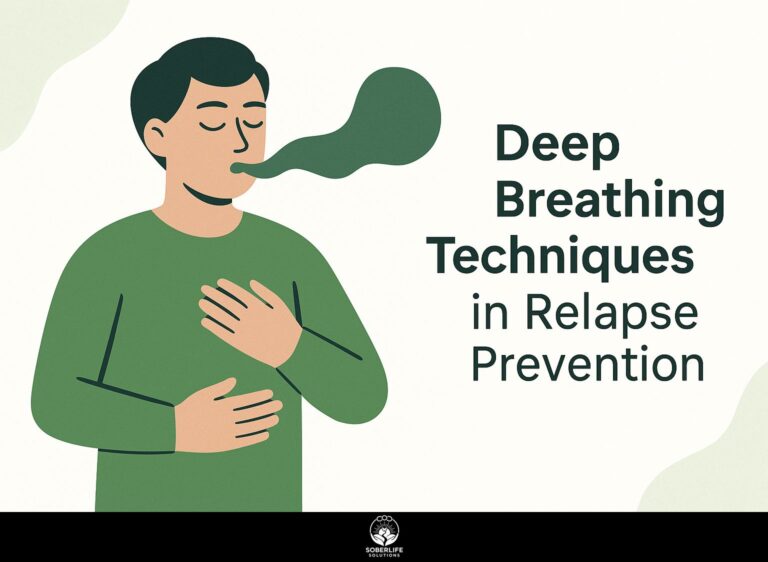Alcohol Counseling Techniques: Types and How They Work
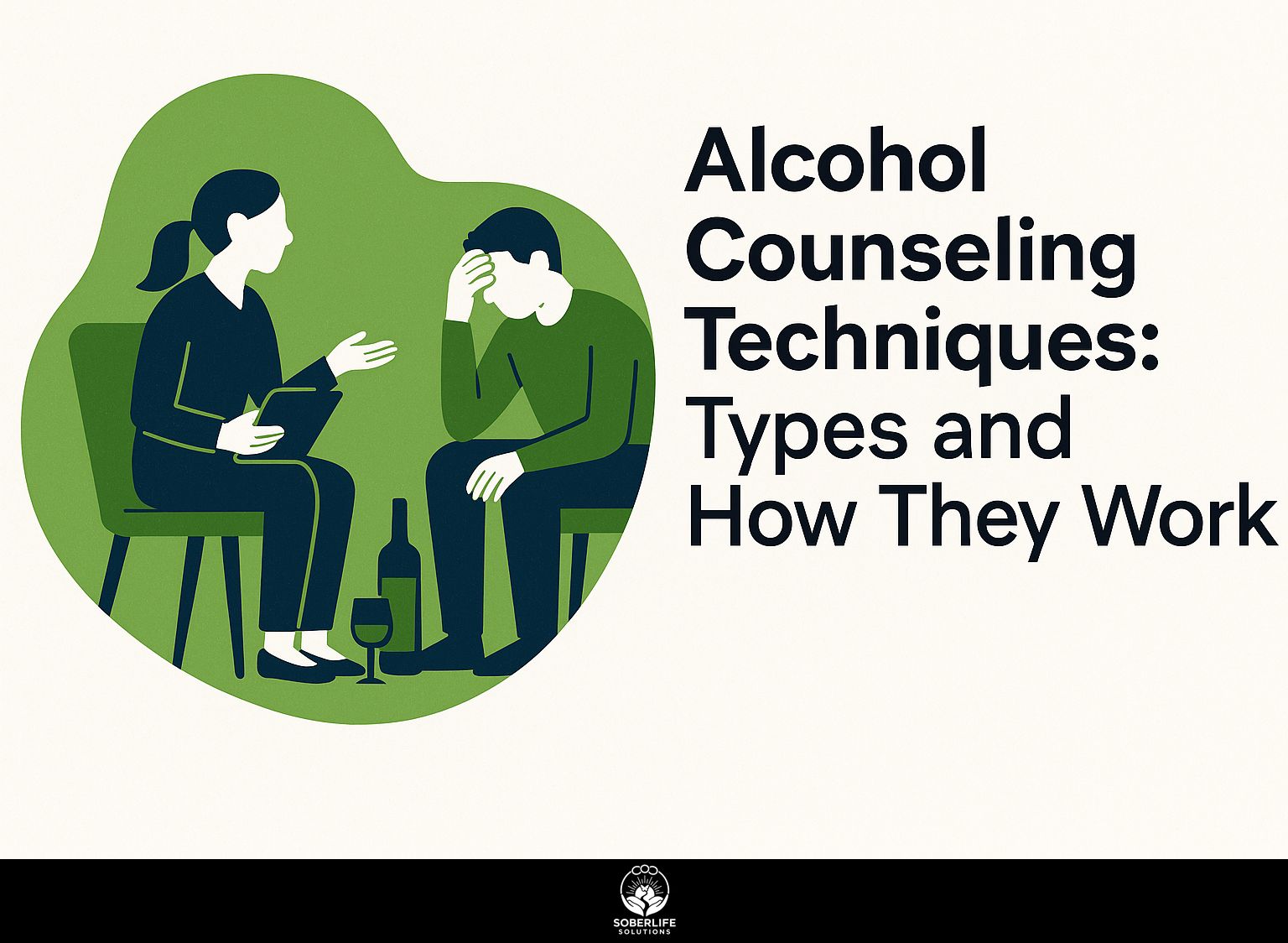
Struggling with alcohol use disorder can feel overwhelming, but effective counseling techniques offer a path to recovery. Whether you’re looking for help from a mental health professional or a health care provider, knowing different methods-like cognitive behavioral therapy and motivational interviewing-can give you confidence in your process. This article explains the different types of alcohol counseling, how they work, and why psychological evaluations and physical exams are important. This information helps you make informed decisions.
Key Takeaways:
Importance of Counseling in Recovery
Counseling can improve recovery results, with studies showing that people who participate in counseling are 30% more likely to stay sober over the long term. This has been supported by findings from ScienceDirect, which highlight the effectiveness of counseling in substance use recovery.
This helpful relationship is important because it allows people to deal with the root problems that lead to substance use.
Programs like Alcoholics Anonymous (AA) provide structured meetings and a community resource, promoting accountability and ongoing support. According to research, participants in AA are significantly more likely to stay sober for longer periods compared to those relying solely on self-management.
Using family therapy can help recovery by strengthening communication and support systems at home, aligning individual goals with family expectations. For an extensive analysis of how these therapies can be effectively integrated, our overview of various alcoholism therapies offers valuable insights.
Overview of Alcohol Use Disorder
Alcohol use disorder affects millions, characterized by a strong craving for alcohol, progressive withdrawal symptoms, and a compulsion to drink despite negative consequences.
Identifying alcohol use disorder is important for early treatment. Symptoms often include increased tolerance, neglecting responsibilities, and withdrawal signs such as anxiety or tremors.
Early detection can lead to more effective treatment options. Detoxification may be recommended, which involves medically supervised withdrawal to manage symptoms safely.
Tools like the Alcohol Use Disorders Identification Test (AUDIT) can help measure how serious the disorder is. According to the Mayo Clinic, groups like Alcoholics Anonymous offer community support during recovery, stressing the need to ask for help as soon as problems appear. For more information on symptoms and causes, the Mayo Clinic offers a comprehensive overview here.
Types of Alcohol Counseling Techniques
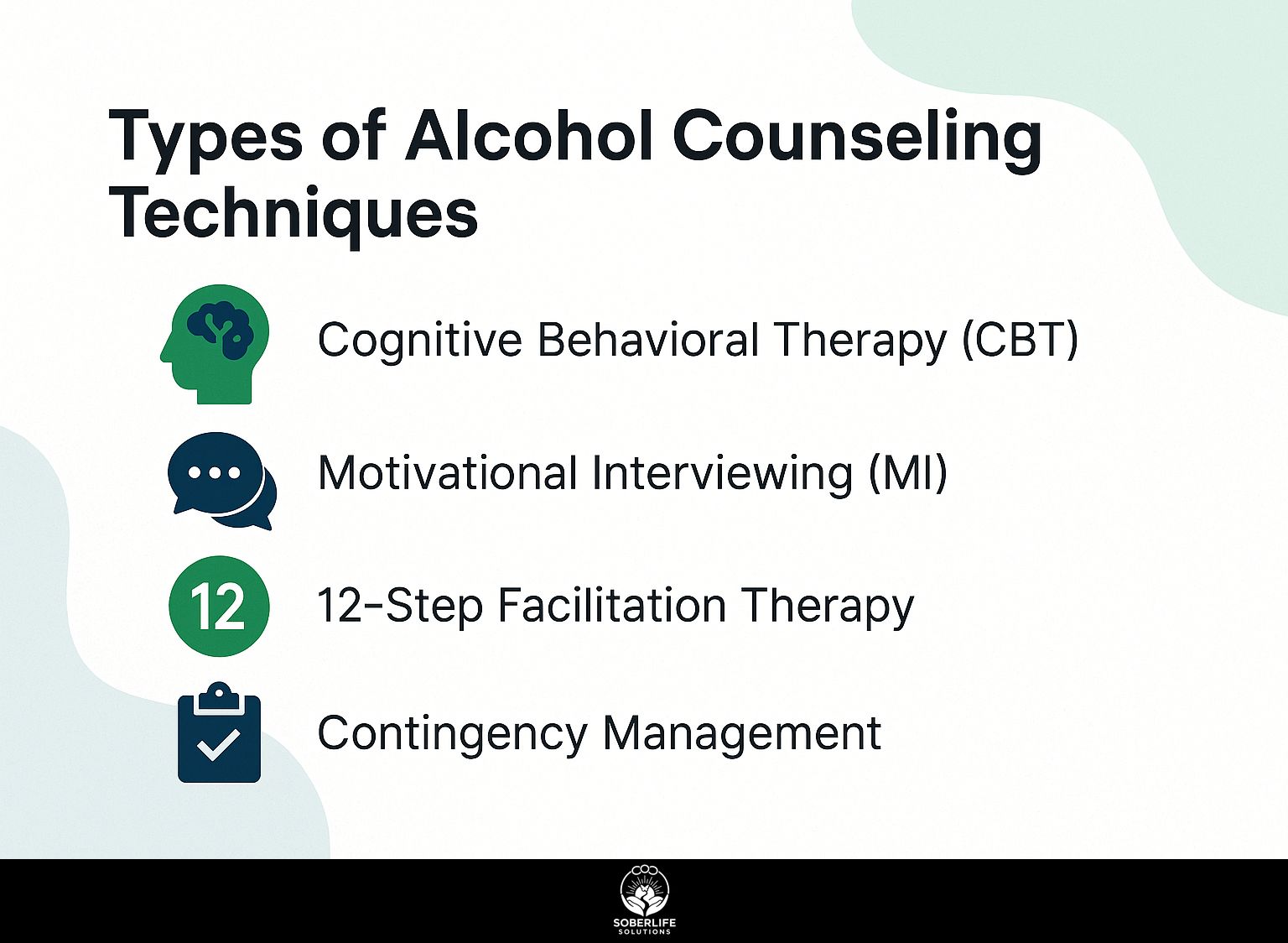
Different counseling methods are used to treat alcohol use disorder, each providing specific approaches suited to the person’s needs. For a comprehensive understanding, exploring various therapies for alcoholism, their techniques, benefits, and pathways to recovery can be enlightening.
Cognitive Behavioral Therapy (CBT)
Cognitive Behavioral Therapy (CBT) focuses on identifying and changing negative thought patterns, helping clients develop effective coping skills for managing cravings.
CBT employs a structured approach, typically involving four stages:
- Assessment
- Cognitive restructuring
- Skills training
- Relapse prevention
In the assessment phase, therapists work with clients to understand their specific triggers and thought patterns.
During cognitive restructuring, negative thoughts are challenged and replaced with healthier alternatives.
Skills training introduces coping strategies, such as mindfulness and problem-solving techniques.
Relapse prevention strategies help clients maintain their progress, with research indicating a 50% reduction in relapse rates for those actively engaged in these practices.
Motivational Interviewing (MI)
Motivational Interviewing (MI) is a counseling approach that focuses on the client and helps people look into their mixed feelings about change, which greatly improves their involvement in treatment.
To successfully use MI, create a welcoming space where clients feel comfortable talking about their emotions. Ask questions that cannot be answered with just “yes” or “no,” such as, “What concerns do you have about this change?”
Reflective listening is important, as it lets you show that you understand and care. Summarize key points to reinforce the discussion and highlight client motivations.
Tools like the Motivational Interviewing Calculator can help you monitor progress, and regular training workshops improve your skills. These strategies contribute to MI’s notable success rate of approximately 70% in treatment adherence. (For more on how MI can assist specific groups, our guide on Motivational Interviewing for Veterans with AUD offers detailed insights.)
12-Step Facilitation Therapy
The 12-Step Facilitation Therapy model, prominently used by Alcoholics Anonymous, emphasizes community support and personal accountability in recovery.
By joining support groups, people can discuss their experiences, creating a space where they understand and care for each other. Hearing others’ stories can help reduce feelings of isolation, while actively engaging in discussions allows for personal reflection.
For example, a newcomer might find solace in shared struggles, motivating them to stay committed. Writing in a journal after meetings can help with personal growth, as people write down what they learned from others.
Attending sessions regularly builds relationships and makes recovery a personal and shared experience.
Contingency Management
Contingency Management uses behavioral incentives to encourage sobriety, rewarding individuals for adhering to treatment goals such as attending counseling sessions and providing clean urine samples.
In this approach, participants can earn rewards like vouchers, which can be redeemed for essential items or services.
Research shows this method increases abstinence rates by 30-40% in participants. For example, a participant who attends six consecutive counseling sessions might receive a gift card for groceries. According to findings highlighted in Health Affairs, these incentives significantly boost treatment outcomes.
Using apps to monitor progress and automatically give rewards can increase involvement and responsibility, leading to clear success.
How Counseling Techniques Work
Knowing how different counseling methods function can help providers create more effective treatment plans that meet their clients’ needs.
Mechanisms of Change in CBT
In Cognitive Behavioral Therapy, methods like changing negative thought patterns and increasing positive activities are essential in helping people overcome alcohol use disorder.
Cognitive restructuring involves identifying and challenging negative thoughts about alcohol, which can include beliefs like ‘I need a drink to relax.’ For example, clients can learn to replace this thought with, ‘I can unwind through exercise.’
Behavioral activation, on the other hand, encourages engaging in pleasurable activities that reduce the likelihood of drinking. This might involve joining a local hobby group or starting a new exercise routine.
By consistently implementing these techniques, clients can develop healthier thought patterns and behaviors, leading to lasting recovery.
Engagement Strategies in MI
Motivational Interviewing uses certain techniques, like asking open-ended questions and listening carefully, to create a space of trust and honesty.
Therapists can increase client commitment to treatment by using techniques such as summarizing the conversation, which helps make communication clear and recognizes feelings. For example, after a discussion on goals, a therapist might say, “It sounds like achieving stability is really important to you.”
Telling a client they’ve done a good job can make them feel more confident. Tools like motivational interviewing worksheets can help structure sessions, enabling facilitators to track progress.
This organized method strengthens client involvement and motivates them to look into their reasons for change.
Choosing the Right Technique
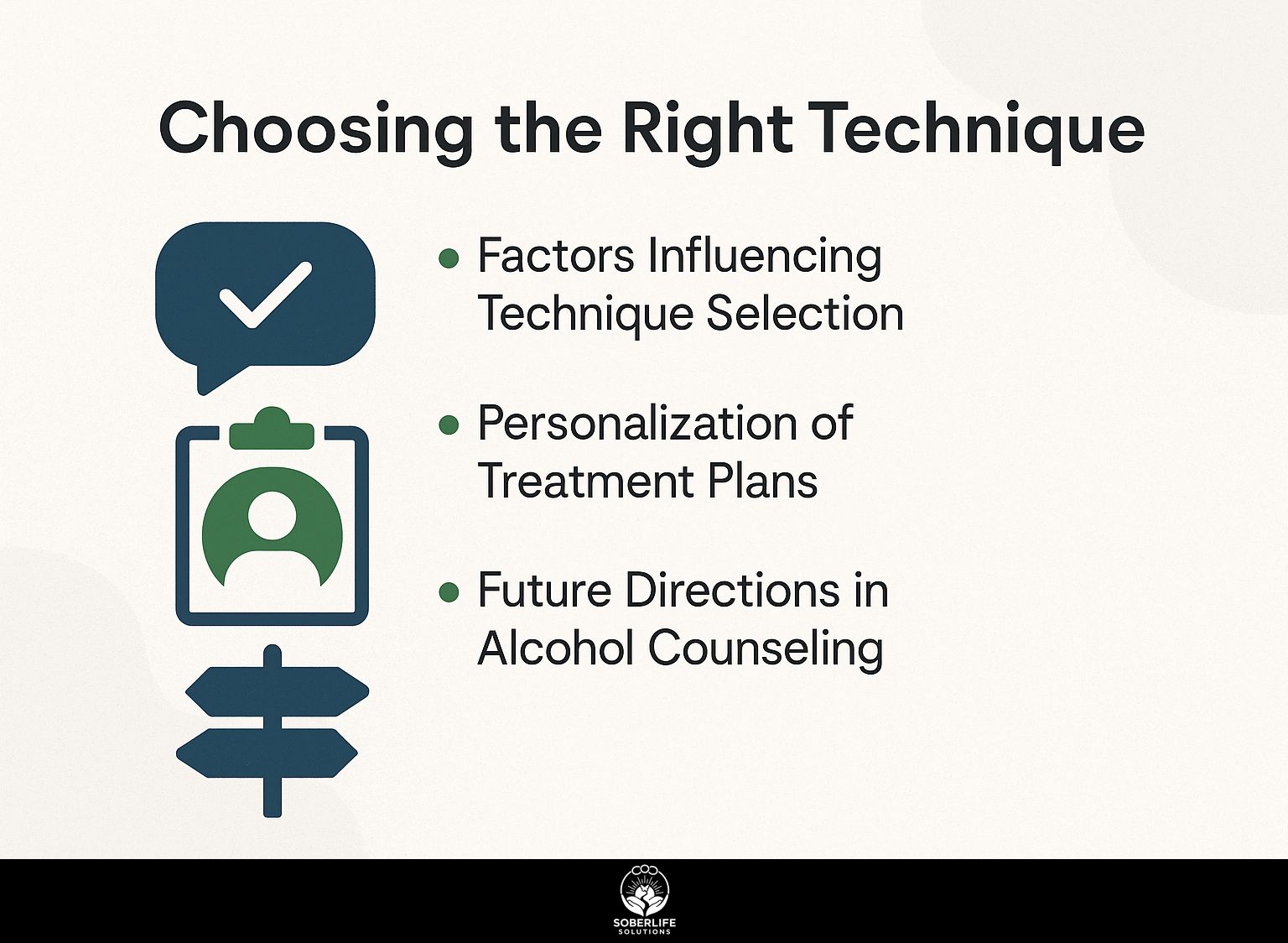
Picking the best counseling approach is important for successful treatment, considering each client’s individual characteristics and preferences. For those interested in effective methods, exploring different therapy techniques like CBT, DBT, and ACT could be beneficial.
Factors Influencing Technique Selection
Important factors affecting the choice of method are how serious the alcohol use problem is, the person’s willingness to change, and their past experiences with treatment.
For example, a person with serious alcohol problems might find it helpful to attend a focused outpatient program that provides organized help and responsibility.
Alternatively, someone who hasn’t thought about changing before might find motivational interviewing helpful. This approach uses gentle encouragement to help them think about making a change.
Past experiences also matter; a client who had a negative experience with a residential program may prefer outpatient options, allowing for a gradual approach.
Adjusting the approach according to these factors increases the chances of effective treatment.
Personalization of Treatment Plans
Creating treatment plans that consider each person’s unique needs and choices improves how well counseling works for treating alcohol use disorder.
To customize treatment well, start with a full assessment that includes psychological tests, self-report forms, and clinical interviews.
Tools like the AUDIT (Alcohol Use Disorders Identification Test) can help understand a client’s drinking habits.
Include clients’ personal goals-like cutting down on social drinking or handling cravings with mindfulness techniques-during the planning stage.
Check these goals often during sessions to adjust the method, ensuring the treatment matches their shifting needs and circumstances.
Involving clients in this joint process helps them take charge and stay dedicated to their recovery path.
Future Directions in Alcohol Counseling
Alcohol counseling is moving towards using digital health tools and mindfulness exercises to meet the overall needs of clients.
Programs are increasingly utilizing mobile apps like Sober Grid and I Am Sober, which connect users with support groups and track sobriety progress.
Using mindfulness methods like meditation or yoga can improve the ability to manage emotions.
For example, a pilot program in California combined these practices, showing a 30% reduction in relapse rates after six months.
By using technology and complete methods, counselors can build a more thorough support system that helps clients actively manage their recovery process. Related insight: Virtual recovery groups trending – Sober Life Solutions
Frequently Asked Questions
What are the different types of alcohol counseling techniques?
Some typical methods used in alcohol counseling are Cognitive Behavioral Therapy (CBT), Motivational Interviewing, 12-Step Facilitation, and Psychodynamic Therapy. Each approach has its own unique focus and may be more suitable for certain individuals.
How does Cognitive Behavioral Therapy (CBT) work in alcohol counseling?
CBT helps individuals identify and change negative thought patterns and behaviors related to their alcohol use. This technique focuses on developing strategies to effectively cope with triggers and prevent relapse.
What is Motivational Interviewing and how does it work in alcohol counseling?
Motivational Interviewing is a counseling method focused on helping people discuss their mixed feelings about changing their alcohol use. Through open-ended questions and reflective listening, clients are encouraged to find their own motivation to make positive changes.
How does 12-Step Facilitation work in alcohol counseling?
This technique is based on the principles of Alcoholics Anonymous and involves attending meetings and working through the 12 steps as a means of achieving and maintaining sobriety. It also provides a sense of community and support for individuals in recovery.
What is Psychodynamic Therapy and how is it applied in alcohol counseling?
Psychodynamic Therapy looks into the mental aspects that might play a role in a person’s use of alcohol. This method focuses on solving unresolved issues, increasing people’s self-awareness and awareness of others, which supports lasting changes in behavior.
Can different alcohol counseling techniques be used together?
Yes, it is common for therapists to use a combination of techniques to address a client’s individual needs. For example, a therapist may use CBT to address specific behaviors and thought patterns, while incorporating aspects of Motivational Interviewing to address the client’s motivation to change.

